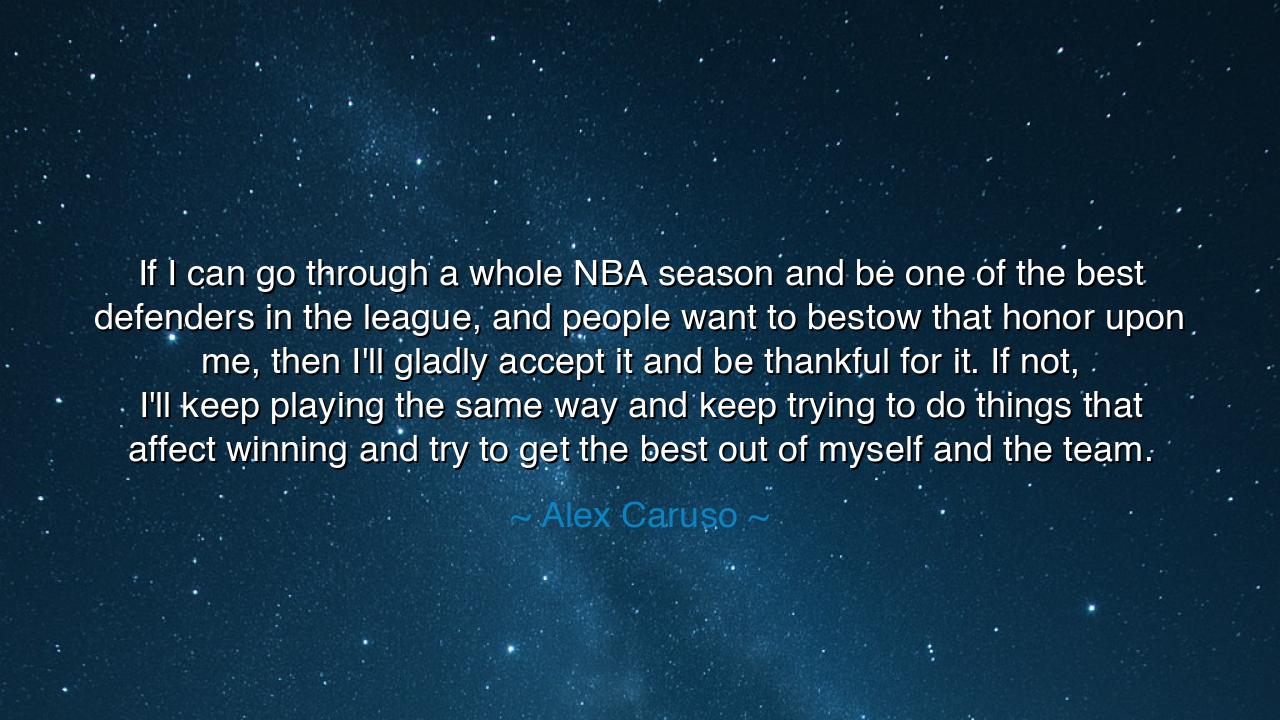
If I can go through a whole NBA season and be one of the best
If I can go through a whole NBA season and be one of the best defenders in the league, and people want to bestow that honor upon me, then I'll gladly accept it and be thankful for it. If not, I'll keep playing the same way and keep trying to do things that affect winning and try to get the best out of myself and the team.






Alex Caruso once declared with quiet strength: “If I can go through a whole NBA season and be one of the best defenders in the league, and people want to bestow that honor upon me, then I’ll gladly accept it and be thankful for it. If not, I’ll keep playing the same way and keep trying to do things that affect winning and try to get the best out of myself and the team.” These words may sound modest, yet within them lies a philosophy as ancient as the warrior codes of old: that true greatness is not bound to recognition, but to the unwavering pursuit of discipline, sacrifice, and service.
In every age, men and women have struggled with the tension between glory and duty. The Greeks told of Achilles, who chose eternal fame over a long life, seeking honor that would echo through the ages. Yet Caruso’s wisdom points to another path, one more aligned with the teachings of the Stoics: that the measure of a man is not what others bestow upon him, but what he continues to give, day by day, regardless of applause. The defender who labors unseen, sacrificing his body so that his comrades may prevail, embodies the same spirit as the shield-bearer in ancient phalanxes, holding the line not for himself, but for the whole.
Caruso speaks of the defender, and this is no accident. For defense is the labor of the unselfish. The scorer may bask in cheers, the star may draw the eyes of the multitude, but the defender works in shadows, stripping the enemy of strength, preserving the chance for his side to triumph. In this role lies a timeless truth: that the greatest victories are often made possible by those who do not seek glory, but who stand steadfast in the places where others falter. Such men and women are the pillars upon which triumph rests.
History gives us countless examples of this spirit. Consider Leonidas and his Spartans at Thermopylae, who held the pass not for personal renown but to give their people time to survive. Or think of George Washington’s winter at Valley Forge, when perseverance and sacrifice forged a nation’s endurance more than any single battle. These defenders did not labor for medals or titles, but for something higher: to affect winning, to draw the best from themselves and those who stood beside them, to serve the greater cause beyond self.
The meaning of Caruso’s words is therefore deeply noble. He accepts that recognition, if given, is a gift, not a right. He understands that honor cannot be demanded; it can only be bestowed freely by others. And if it never comes, his mission remains unchanged: to protect, to serve, to elevate the team. This is a rare wisdom in a world consumed by pride and comparison. It is the wisdom of those who know that true power lies in consistency, humility, and devotion to a cause greater than themselves.
The lesson for us is clear. We must labor not for the fleeting crown of recognition, but for the enduring strength of character. We must be willing to do the hidden work, the unglamorous tasks, the silent sacrifices that sustain families, communities, and nations. If honor comes, let us be thankful, but if it does not, let us never falter, for the value of our labor lies not in applause but in the change it brings to those around us.
Practical wisdom may be drawn. In your own life, seek not always the spotlight, but the chance to defend, to protect, to uplift. Be diligent in your duties, even when unseen. Encourage those who strive quietly, for they are the backbone of every victory. And cultivate gratitude—for both recognition and obscurity can be blessings, if met with the right spirit.
Thus, Caruso’s words endure as a teaching for all: play the same way, give your all, seek the best of yourself and your team, whether the world notices or not. This is the creed of the selfless warrior, the faithful defender, the one who measures success not by trophies, but by the truth of effort and the strength of devotion. And such men, whether honored in the moment or not, will always be remembered in the eternal chronicles of greatness.






AAdministratorAdministrator
Welcome, honored guests. Please leave a comment, we will respond soon